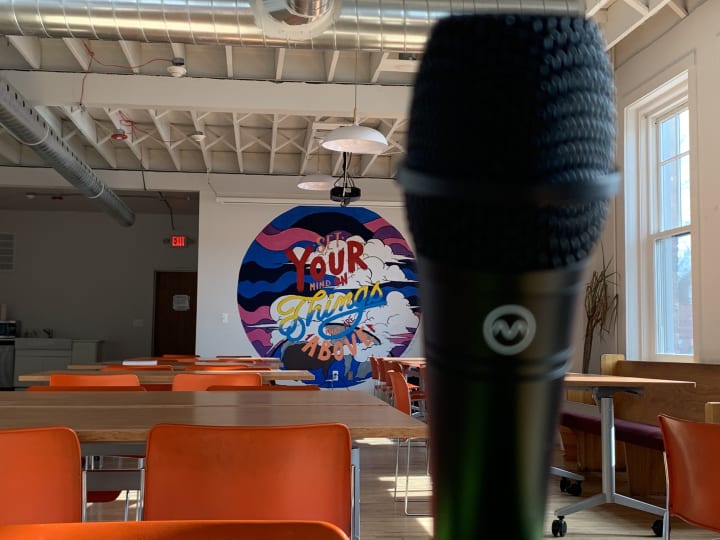Music, Therapy, and You!
Episode 1: What is Music Therapy?

Hello Everyone! My name is Ebony Swain and I am a music therapist in training. During my time learning about the power of music, I felt that there were too many people who had no idea about the magical work that we do. There are so many questions and theories about topics controversial or not that I have had and I always wanted to fill that void for myself and others. I decided to start my Vocal Journey talking about things I love - music therapy, psychology, and mental health.
So without further ado, welcome to Music, Therapy, and You!
So let's start with the obvious: what is music therapy? To be honest, this is a hard question to answer. How do you explain it? Words truly don't do it justice. Music therapy requires .both an objective and subjective perspective. Our music infused strategies derive most of their power from personal connections. We like to think of ourselves as "musical companions on the journey to wellness". Our clients can face educational challenges, lifelong conditions or troubling patterns of behavior. Or, they could be healthy, simple seeking ways to cope. Here's my favorite definition, said by Kenneth E. Bruscia in 1998:
"The therapist helps the client to promote health using music experiences and the relation that develop through them as a dynamic force of change."
I especially enjoy the ending about being a dynamic force of change. That just sounds so powerful to me. Because, in the end, that's what therapy is all about, that change. Wanting to change the way you're living for the better, whatever form that may take for you. Whether you're trying to change your outlook on life or change your way of life, music therapy can be an amazing first step.

I know everyone has their favorite song, that when it comes on, their soul just starts dancing and they light up the room. I can never keep a favorite song for long, as I introduce myself to new music and new sub-genres all the time. Everyone has cried with Sam Smith or raved to Deadmau5. We turn to music when we're in love, we turn to music when we're out of love, and over the lost of a loved one. When you ask most people how they cope with the day to day stresses, or what the top five things they would have with them on a deserted island, one answer is always music. The quote "life without music would Bb" is more literal than people realize. We have thousands of songs for every occasion, emotion, and mood setting, Often times, we literally think the song was written just for that situation or just for us when we need it most. Music is therapeutic for us all, and with extra refining and a sprinkle of powerful, interpersonal connections, we can go even further.
Infants in neonatal intensive care unites have been shown to make statistically and clinically significant health improvement when exposed to certain music-based interventions (Allen,2013; Stanley, 2002). Chronically ill premature infants who require regular suctioning of their airways slept more, their oxygen saturation improved, and recovery time was faster, when music strategies were employed. Infants can also be pacified by music when not able to under other means (Ribaupierre, 2004) .
Music therapists serve young children in early intervention to enhance readiness for school and improve all aspects of their growth (Kern and Humpal, 2013) . Children with diagnosed developmental disabilities will have a more concentrated approach to enhance learning and growth. Music Therapy is beneficial for children diagnosed with:
Learning disabilities
Autism Spectrum Disorder (Dieleninik, Geretsegger et al, 2017)
Behavorial and Communicative Disorders
Physical challenges and developmental delays
The various conditions that are diagnosed and described under children conditions also affect their adolescence. Many music therapists specialize in adolescence and have expertise in the unique challenges facing individuals at this stage of development. Group improvisation is used as a metaphor for understanding patterns of interpersonal interaction within a family or amongst peers who are playing together . Within a family therapy model, music therapists help parents and children communicate.
Music therapists modify their goals for adults to include continued independence and social competence. Adults with mental health conditions are encouraged to use the music to get to the core of their emotions and feelings (group therapy also works well here) . Special applications of music therapy for adults with:
PTSD and other trauma
Addiction (Aldridge,2010) Corrections (Dickenson, Odell-Miller and Adlam, 2013)
Neurological Rehabilitation
With advanced age comes physical changes that may result in degenerative diseases and losses that put older adults at risk for conditions such as depression. Memory cafes are engaging individuals with mild cognitive decline along with families and volunteers to expand their creative repertoires together . Senior centers and community agencies are now offering music therapy services to their constituents . Individuals who have demential to Alzheimer's Disease can participate actively and contribute music skills that are often spared compared to other degenerating functions (Aldridge, 2001).
There are so many more uses and benefits that I couldn't possibly put them all in one episode even if I wanted (and with the quarantine, I was very tempted). This is barely scratching the surface of the power of music, and I plan on taking you all for a ride with me. During my music therapy training, career, and all events in between. If you have any questions, or have something you'd like for me to talk about, let me know! If this peaked your interest even a little, stay on standby for more! Until next time~
About the Creator
Ebony Swain
College Student * Musician * Music Therapist in Training * Beginner Music Producer * Mental Health Advocate *Just a girl with a passion for music and powerful conversation.






Comments
There are no comments for this story
Be the first to respond and start the conversation.